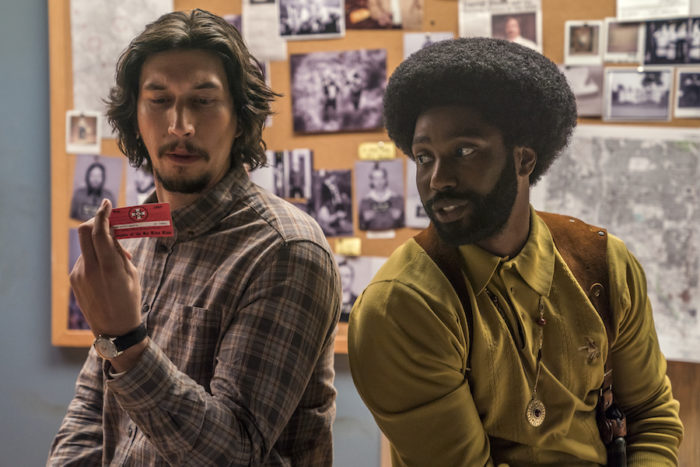VOD film review: BlacKkKlansman
Review Overview
Style
8Damage
9Aggression
8Nathanael Smith | On 24, Dec 2018
Director: Spike Lee
Cast: John David Washington, Adam Driver, Alec Baldwin
Certificate: 15
BlacKkKlansman is not a particularly subtle film. It’s a film where racists air their views without any kind of filter, saying the kinds of things that are so hateful it would feel like parody were it not rooted in reality. It’s set in the 1970s, but features screamingly obvious references to the present day. It ends with an extended selection of clips from the Nazi rally in Charlottesville that resulted in the death of Heather Heyer.
But is subtlety what the modern era requires? Spike Lee doesn’t seem to think so. BlacKkKlansman isn’t a quiet, considered character study: it’s a polemic. Its premise – that a black rookie cop went undercover to infiltrate the KKK – is so patently absurd that it must be real. It’s a comic farce and a harrowing examination of the state of a nation pushed wonkily into the same film and somehow getting away with it. Subtlety was never the aim.
Its success is due partly to the performances of its two leads, John David Washington and Adam Driver. Washington has inherited his father’s mellifluous voice, with a sing-song tone that can switch effortlessly from soothing to authoritative. Both he and Driver play multiple roles with their characters. They’re gung-ho racists, uneasy cops, civil rights activists and restrained rule-abiders, sometimes switching between them within the space of a sentence. They all require different tones, to be adopted at the flick of a switch, and Driver and Washington pull it off with aplomb. Less nuanced but equally effective is Topher Grace as KKK leader David Duke, rejecting any notion of Duke as a great thinker or strategist and playing him merely as a dumb, dumb man. It fits.
BlacKkKlansman’s sense of humour dares you to laugh at some of the worst people that America has to offer. Make no mistake: this is a comedy, but it’s one that you’ll feel awkward laughing at. Through it all, Lee’s sense of style keeps it uncomfortably entertaining. He throws everything at the wall: asynchronous sound; floating heads fading in and out of the frame; scathing juxtapositions in his edits. It’s chaotic and colourful, with production design that looks effortless, and the result is a film that’s exciting, even as it viciously skewers modern American politics.
One of BlacKkKlansman’s targets is the continued reverence for the film The Birth of A Nation. One scene sees his camera tracks along an audience of KKK members as they whoop and holler at the film, cheering on their forebears and jeering at the depictions of black characters in the film. Almost any review you’ll read of that film will express something along the lines of “racism aside…” and Lee rebukes that idea. “Racism aside” is too much of a caveat.
Griffith’s film revitalised the Klan and its continued place in the canon emboldens the Lost Cause narrative of the Civil War, coming to the aid of those who would defend Confederate statues. The Birth of a Nation might have been the first blockbuster, or whatever hallowed claim you wish to make about it, but in its blatant racism and propaganda, it was certainly not subtle. So when your battle is against overt and vicious propaganda that gives a voice to white supremacy, maybe subtlety isn’t the weapon of choice. Maybe you need a hammer.

















